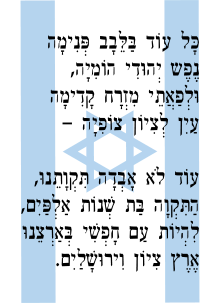Hatikvah
This is the sighted version that was marked on January 14, 2021. There are 2 pending changes that still need to be sighted.
The haTikva (Hebrew הַתִּקְוָה ha-Tiqwah or unpunctuated and Plene התקווה, 'the hope'; also spelled Hatikva or Hatikvah) is the national anthem of the State of Israel. The lyrics are taken, in abbreviated form, from the 1878 poem Tikwatenu ("Our Hope") by Naphtali Herz Imber (1856-1909). The melody probably dates from 1888 and is attributed to the composer Samuel Cohen.
The haTikva has been the anthem of the Zionist movement since 1897. With the founding of the State of Israel on May 14, 1948, the text set to music was declared the national anthem. However, a change was made at the end of the poem: Instead of Imber's expressed hope that Jews would return to the land of their forefathers, it has since read, "... to be a free people, in our land of Zion and in Jerusalem." In 2004, the national anthem status was legally established by the Knesset.
The haTikva is sung in many synagogues and Jewish communities, including in the Jewish Diaspora. This is often the case, for example, on Israel's Independence Day (Yom haAtzma'ut), on Remembrance Day for the Fallen of Israel's Wars (Yom haZikaron), and on Holocaust Remembrance Day (Yom haSho'a).

Lyrics of the National Anthem of Israel - Hatikwah
Music
![\relative d' {\key d \minor \autoBeamOff d8[ e] f g a4 a | bes8[ a] bes[ d] a2 | g4 g8 g f4 f | e8[ d] e[ f] d4. a8 | d8[ e] f[ g] a4 a | bes8[ a] bes[ d] a2 | g4 g8 g f4 f | e8[ d] e[ f] d2 | d4 d' d d | c8 d c[ bes] a2 | d,4 d' d d | c8 d c[ bes] a2 | c4 c8 c f,4 f | g8[ a] bes[ c] a4( g8) f | g4 g f f8 f | e d e[ f] d2 | g4 g8 g f4 f | g8[ a] bes[ c] a4( g8) f | g4 g f f8 f | e d e[ f] d2 \bar "|."} \addlyrics { Kol od ba -- le -- waw pe -- ni -- ma Ne -- fesch je -- hu -- di ho -- mi -- ja U -- l'fa -- tej mis -- rach ka -- di -- ma a -- jin le -- zi -- jon zo -- fi -- ja. Od lo aw -- da ti -- kwa -- tej -- nu Ha -- tik -- wa bat schnot al -- pa -- jim: Lih -- jot am chof -- schi be -- ar -- ze -- nu E -- rez Zi -- on wi -- jru -- scha -- la -- jim. Lih -- jot am chof -- schi be -- ar -- ze -- nu E -- rez Zi -- on wi -- jru -- scha -- la -- jim. }](https://www.alegsaonline.com/image/1f4qvcs6.png)
The melody of haTikwa goes back to an unknown European folk song that appears in Spanish and Polish folk music, among others, and has been adopted into the song repertoire of many European countries (e.g. La Mantovana, Ack Värmeland, du sköna). The main theme of Bedřich Smetana's symphonic poem Vltava ("The Moldau") also bears similarities to this melody. The music was probably brought into the version in use today by Samuel Cohen in 1888; the orchestral arrangement is by Paul Ben-Haim. Another arrangement for large orchestra is by Kurt Weill.
Text
The text of haTikva is taken from the first stanza of the poem Tikwatenu (Our Hope) by Naphtali Herz Imber (1856-1909), written in 1878. When haTikva was declared the national anthem of the newly established State of Israel in 1948, the text, which had previously been about the wish to return to Zion, was changed as shown below. The verse "So long is our hope not lost" is a reinterpretation of the biblical verse Ez 37:11 EU ("Our hope is lost") from the prophet Ezekiel's "Dream of withered bones".
In the following, the original Hebrew text of the modern hymn is reproduced with transcription and German translation.
| כל עוד בלבב פנימה עוד לא אבדה תקותנו, | Kol od ba-lewaw penima - Nefesh yehudi homija Od lo awda tikwatejnuHa-tikwa | As long as still in the heart a Jewish soul dwellsand so long is our hope not lost, |
Questions and Answers
Q: What is the name of the national anthem of Israel?
A: The national anthem of Israel is "Hatikvah".
Q: Who wrote the original poem that "Hatikvah" was based on?
A: The original poem that "Hatikvah" was based on was called תקותנו (Tikvatenu) and it was written by Naphtali Imber.
Q: What are the lyrics to "Hatikvah"?
A: The lyrics to "Hatikvah" tell about the 2000-year-old hope of the Jewish people to return to their homeland, Israel. It uses only the first stanza and refrain from Imber's poem, with a slight change in the last line of the refrain.
Q: Where did Samuel Cohen find the music for "Hatikvah"?
A: Samuel Cohen found himself humming an old folk song one day which he used as inspiration for creating music for "Hatikvah".
Q: Why is it unusual for a national anthem to be in a minor key?
A: It is unusual for a national anthem to be in a minor key because it sounds sad, but in this case, it reflects Jews' hope that their sadness will eventually turn into joy.
Q: How long has Jews' hope been around?
A: Jews' hope has been around for 2000 years.
Search within the encyclopedia